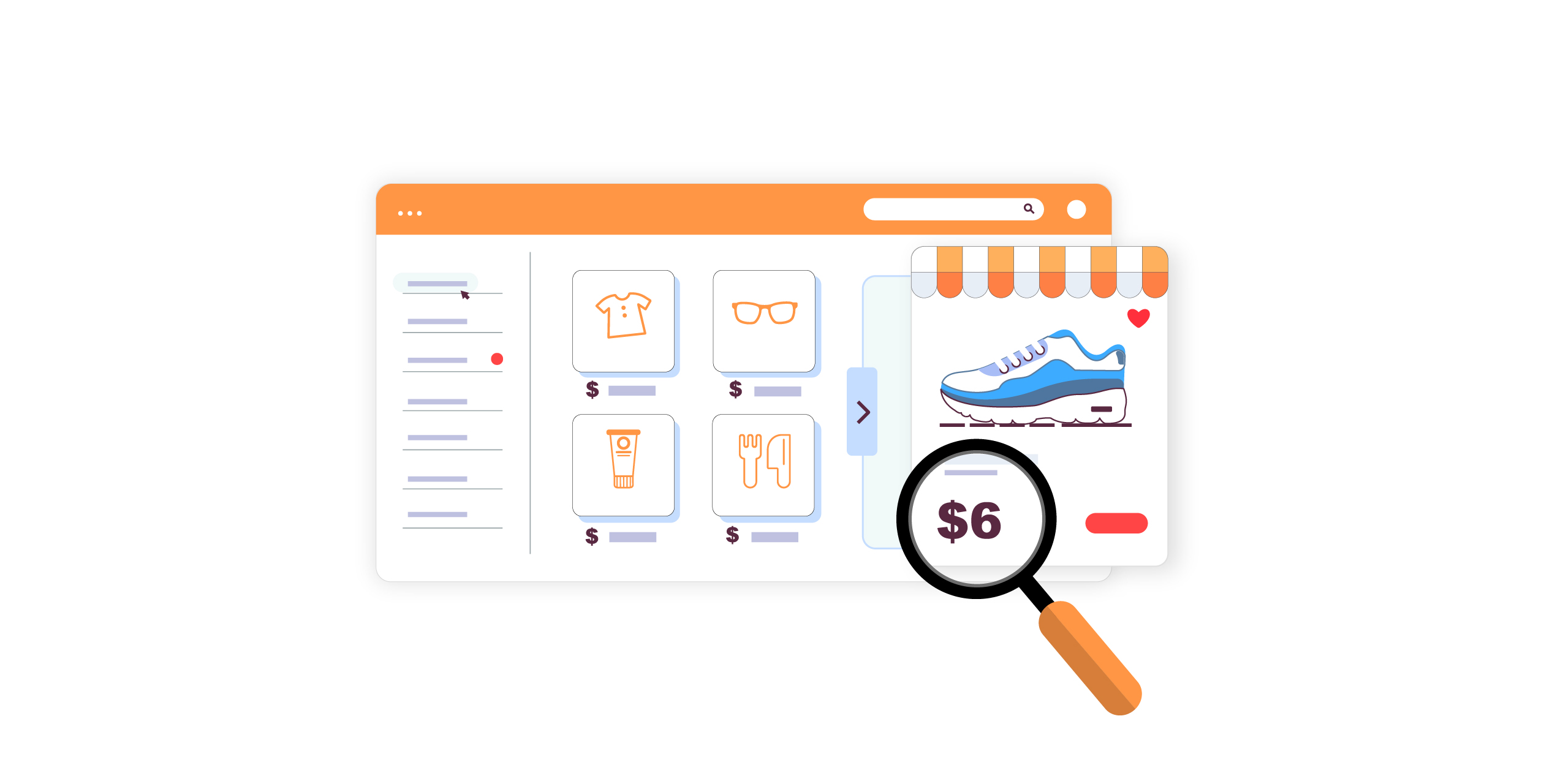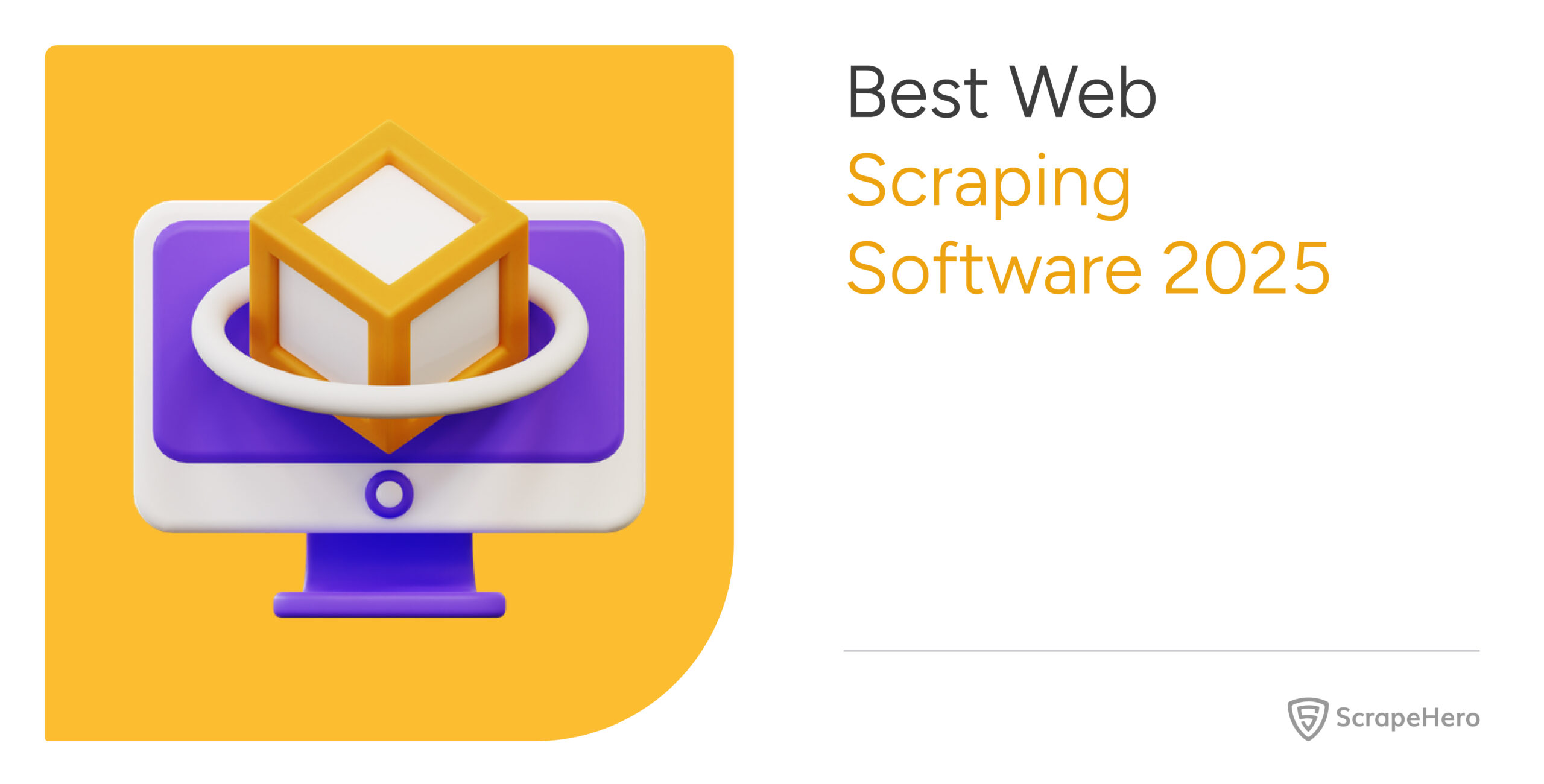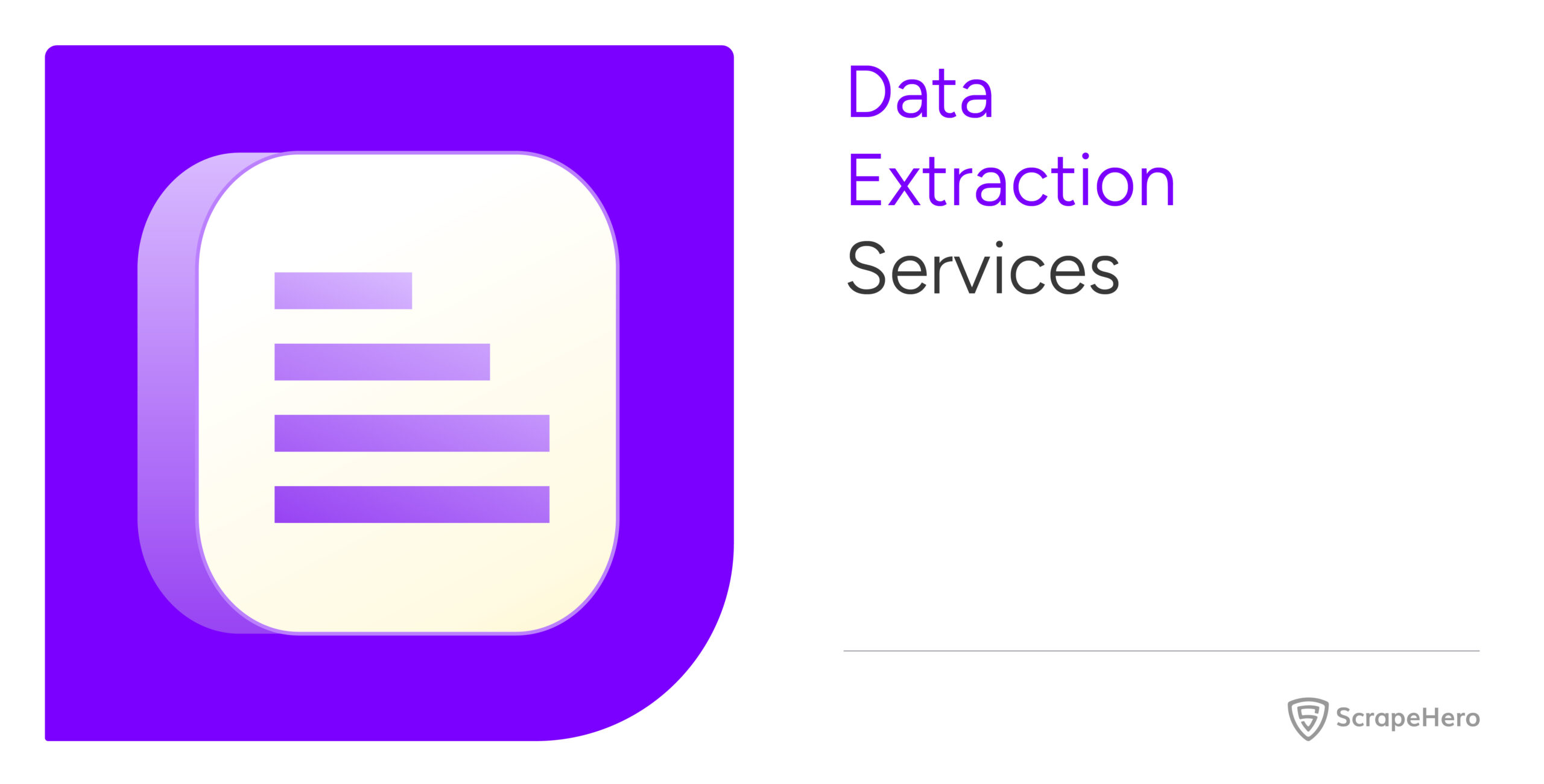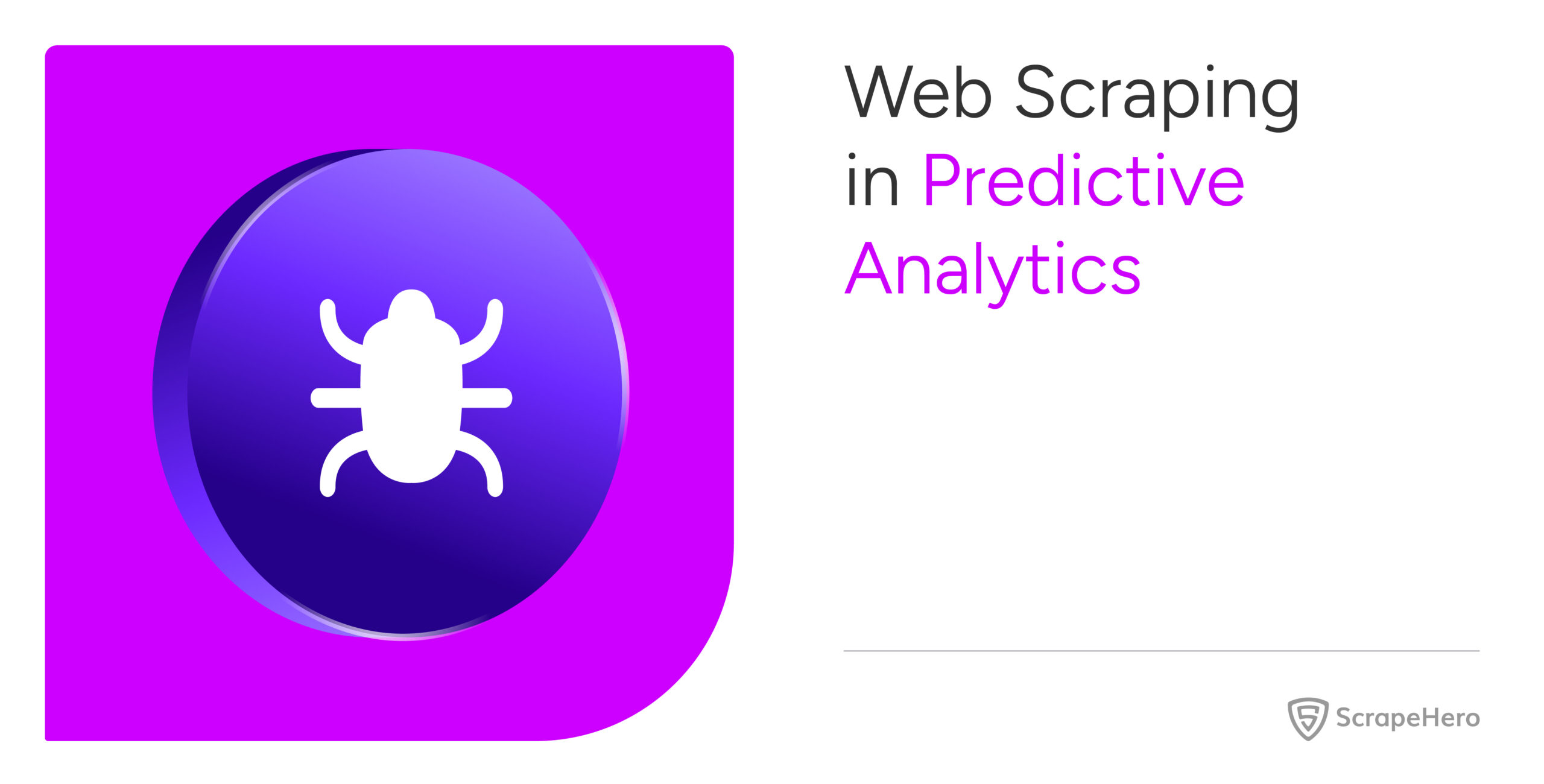Unlike in physical stores, online buyers can easily compare the products available in the market before buying. This is one of the reasons why businesses, especially e-commerce businesses, rely on price monitoring tools to keep track of competitors’ prices and use the insight to price their products accordingly.
Price monitoring is the regular tracking and analyzing of the prices of similar products or services offered by competitors. Businesses regularly utilize these tools to monitor prices and ensure a competitive place in the market.
In this blog, we have compiled a list of the ten best price monitoring tools available in the market in 2024. These tools for monitoring prices are utilized by businesses regularly to ensure a competitive place in the market.
|
Tool |
Major Feature |
Pricing |
| ScrapeHero Amazon Price Monitoring API | Extracts real-time price data | Starts at $5/month |
| ScrapeHero Shopify Price Monitoring Crawler | Extraction of price data | Free for upto 25 pages, paid plans start at $5/month |
| ScrapeHero Walmart Price Monitoring API | Retrieves up-to-date price data | Starts at $5/month |
| ScrapeHero Target Price Monitoring Crawler | Extraction of price data | Free for upto 25 pages, paid plans start at $5/month |
| PriceSpider | MAP price monitoring tool | Undisclosed pricing |
| Repricer | Price adjusting tool | $179/month |
| Competera | Optimizes prices | Undisclosed |
| Price2Spy | Dynamic pricing and price monitoring tool | $26.29/month |
| Prisync | Price tracking | $99/month |
| Dealavo | Price monitoring and dynamic pricing | Undisclosed |
Best E-commerce Price Monitoring Tools
Price monitoring tools are software applications designed to track competitors and the prices they offer, especially in the e-commerce space. This section discusses the ten best price monitoring tools for online price monitoring and competitor analysis.
1. ScrapeHero Amazon Price Monitoring API
The ScrapeHero Amazon Price Monitoring API is one of the best e-commerce price monitoring tools for monitoring competitor prices on Amazon. It is an API that can easily be integrated with your application to receive the scraped data. It can provide up-to-date information on product pricing and availability.
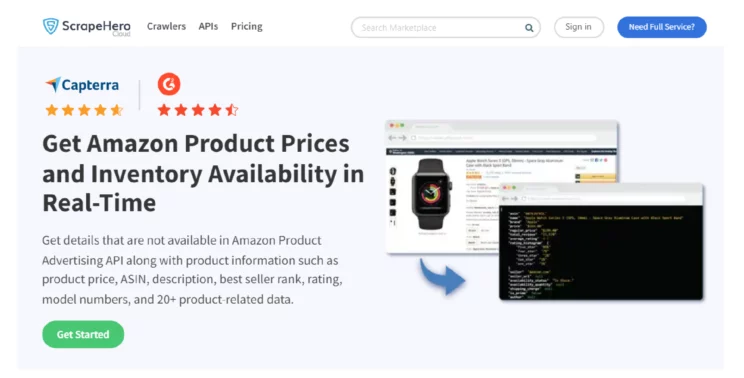
Pros
- This e-commerce price monitoring tool is highly flexible and can work with various Amazon domains.
- The API automatically handles changes in Amazon product page structures.
- ScrapeHero’s API can retrieve more data points compared to the official Amazon API.
- It uses the best residential proxies to route your requests to avoid IP bans and captchas.
Cons
- The scraper requires you to know basic programming to write and maintain the API interface on your side.
Pricing
- The ScrapeHero Amazon Price Monitoring API follows a tiered subscription-based model, offering different plans with varying numbers of API calls and concurrent jobs.
- For businesses requiring frequent data extraction, the cost per API call can be quite affordable, especially with higher-tier plans.
- The pricing of this competitor price monitoring tool starts at $5/ month.
2. ScrapeHero Shopify Price Monitoring Scraper
The ScrapeHero Shopify Price Monitoring Scraper is one of the best online price monitoring tools for extracting pricing details from any Shopify-powered website. Since it works with any Shopify website, this scraper makes it easier to track prices across various competitors.
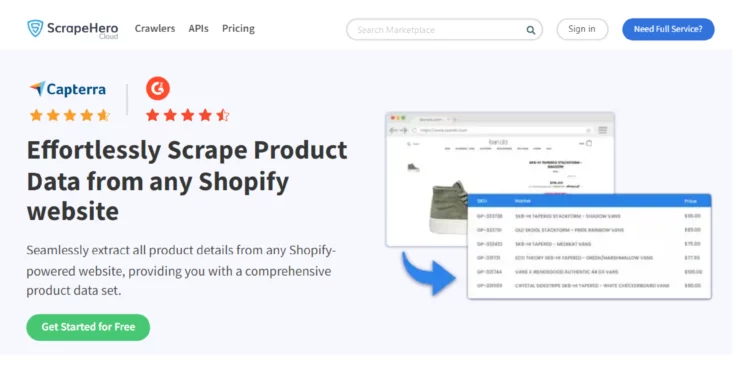
Pros
- The ScrapeHero Shopify Price Monitoring Scraper is an easy-to-use scraper that doesn’t require you to know any coding. It is as easy as copying and pasting.
- This scraper offers a free plan with a 25-page limit, making it accessible for basic price monitoring tasks.
- It can also extract product details like descriptions, titles, and variants.
- The scraper can be scheduled hourly, daily, or weekly to extract data periodically.
- It is a zero-maintenance scraper that ScrapeHero handles.
Cons
- The scraper might not be as customizable as building your own solution. If you have specific data extraction needs beyond the provided options, consider contacting ScrapeHero to build a custom scraper.
Don’t want to code? ScrapeHero Cloud is exactly what you need.
With ScrapeHero Cloud, you can download data in just two clicks!
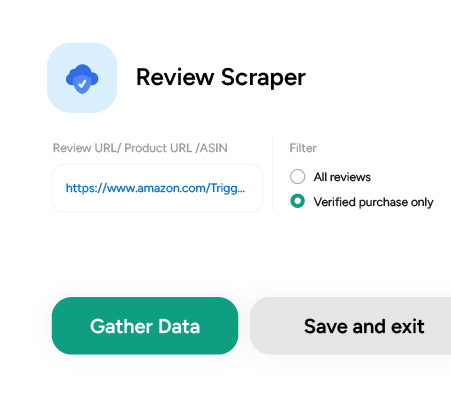
Pricing
- This competitor price monitoring tool offers a tiered pricing model with options varying on increasing page quotas and concurrent jobs.
- It is an affordable option to monitor prices on Shopify-powered websites, costing only $3.75 per 1000 pages when opting for the Ultra plan.
- A free plan with a 25-page limit allows users to try the tool and test its functionality without any upfront costs.
3. ScrapeHero Walmart Price Monitoring API
The ScrapeHero Walmart Price Monitoring API is an e-commerce price monitoring tool specifically designed to extract data from the Walmart website for monitoring competitor prices. It provides up-to-date information on product pricing and the availability of Walmart listings.
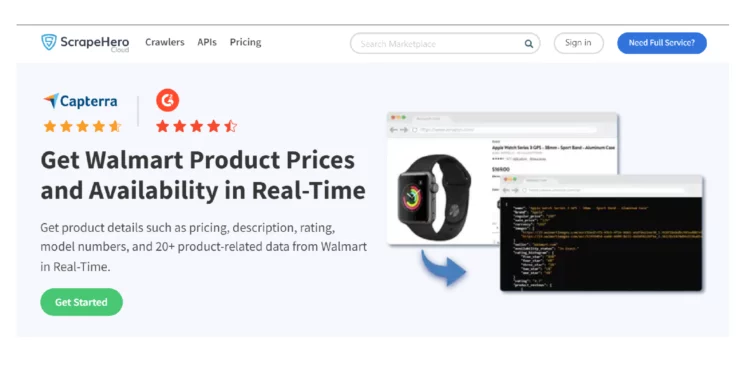
Pros
- The ScrapeHero Walmart Price Monitoring API can be integrated with your applications to stream the extracted data seamlessly.
- It offers a flexible and user-friendly solution compared to the official Walmart API.
- This API can return highly structured JSON data in real time within seconds.
- It uses the best residential proxies to route your requests to avoid IP bans and captchas.
Cons
- Integrating the API into your system involves writing and maintaining code, so some programming knowledge is necessary.
Pricing
- The ScrapeHero Walmart Price Monitoring API offers a flexible subscription model with various tiers. Each tier provides a specific number of API calls and the ability to handle multiple scraping tasks simultaneously.
- The pricing of this competitor price monitoring tool starts at $5/ month.
4. ScrapeHero Target Price Monitoring Scraper
The ScrapeHero Target Price Monitoring Scraper is a competitor price monitoring tool designed to extract pricing information from Target. It allows you to periodically access product details in addition to pricing on a spreadsheet.
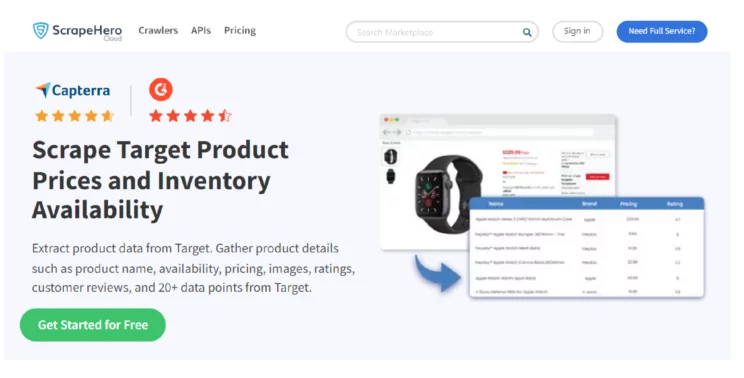
Pros
- The ScrapeHero Target Price Monitoring Scraper is an easy-to-use tool for monitoring prices because it doesn’t require coding knowledge.
- It allows you to scrape data periodically by scheduling the crawlers on an hourly, daily, or weekly basis.
- It is a zip code-based scraper that allows you to get location-based data.
- You can get the required data by just providing the URL and zip code as input.
Cons
- You depend on ScrapeHero’s functionality and uptime for data access.
Pricing
- This e-commerce price monitoring tool offers a tiered pricing model with options varying on increasing page quotas and concurrent jobs.
- The scraper is very affordable, costing you only $3.75 per 1,000 pages.
- The scraper can be used to extract data from upto 25 pages for free.
5. PriceSpider
PriceSpider is a platform that offers software solutions for brands to manage their online presence and sales. Its tool, Prowl, focuses on monitoring the Minimum Advertised Price (MAP).
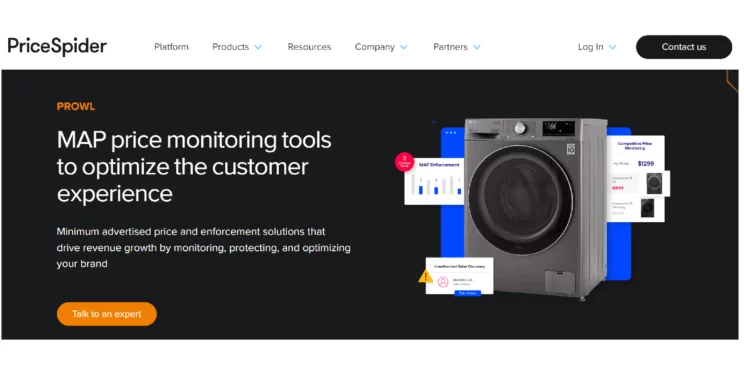
Pros
- Prowl can track competitor pricing and identify unauthorized sellers.
- The platform is user-friendly with a clear interface.
- The data can be used to identify pricing discrepancies, enforce MAP compliance, and optimize pricing strategies.
Cons
- Prowl is a paid service, and the cost can vary depending on the features and data volume required.
Pricing
- Not publicly disclosed on the website.
6. Repricer
Repricer is a software specifically designed to automatically adjust the prices of your products. It monitors competitor prices and adjusts your prices accordingly, leading to higher sales.
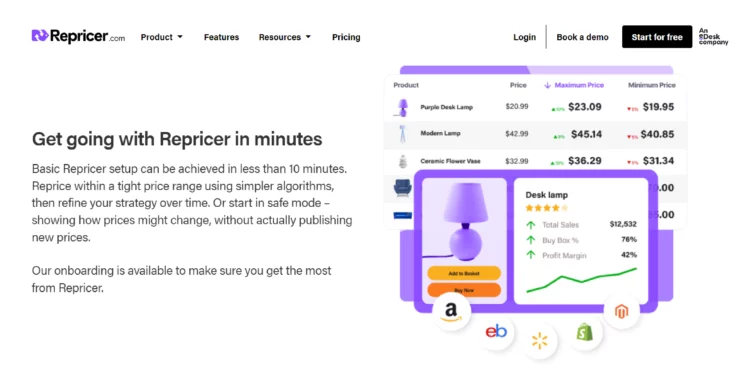
Pros
- The software continuously monitors competitor prices and can react instantly to any changes.
- You can define specific rules and parameters for repricing, such as minimum price limits, desired Buy Box position, and profit margin targets.
- It has a feature called safe mode, which allows you to see how prices will change without actually publishing the data.
Cons
- Repricer’s focus on staying competitive may sometimes lead to price wars, which could potentially reduce profit margins.
- The effectiveness of Repricer heavily relies on the accuracy of the competitor data it collects. Data discrepancies can lead to suboptimal pricing decisions.
Pricing
- Repricer allows for a 14-day free trial.
- Paid plans start at $179 a month.
7. Competera
Competera.com is a platform offering AI-powered pricing solutions for retailers. Its solution helps businesses optimize their pricing strategies across various channels, including online and offline stores.
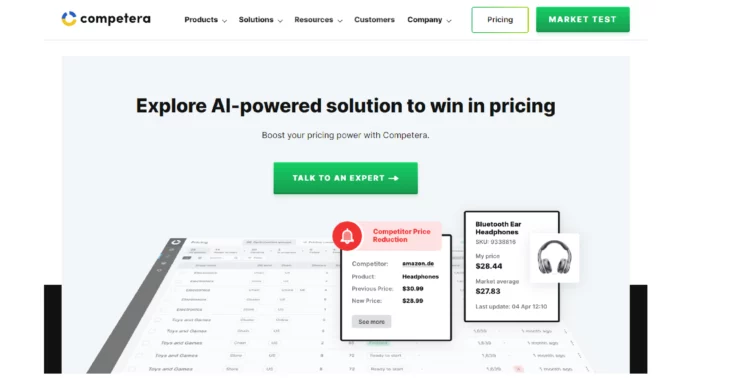
Pros
- Competera uses advanced algorithms and machine learning to analyze factors like competitor pricing, market trends, demand elasticity, and historical sales data.
- Demand-Based Pricing: Competera goes beyond simply matching competitor prices. Their AI technology analyzes customer demand patterns and product elasticity to determine the ideal price point that maximizes profit while considering customer responsiveness.
- They offer solutions for managing pricing across online stores, physical stores, and marketplaces.
Cons
- The platform utilizes AI and advanced algorithms. For users unfamiliar with data-driven pricing strategies, this can be a significant learning curve.
- Competera primarily targets larger businesses, so it might not be affordable for smaller retailers with limited budgets.
Pricing
- The prices are undisclosed.
8. Price2Spy
Price2Spy is dynamic pricing, price monitoring, and optimization software designed specifically for e-commerce businesses. It can track competitor pricing across different online marketplaces and stores.
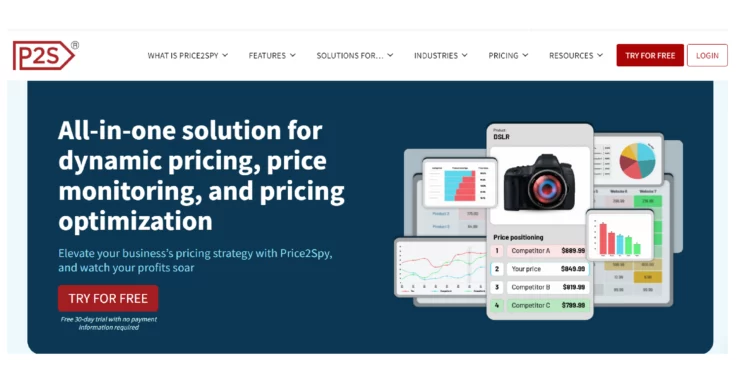
Pros
- This online price monitoring tool allows you to set up real-time alerts to be notified whenever a competitor changes their pricing.
- It can provide detailed reporting and analytics into competitor pricing history, trends, and overall market dynamics.
- It can automate price adjustments based on pre-defined rules and parameters.
Cons
- This e-commerce price monitoring tool offers a limited number of integrations.
- Price2Spy has limitations in data format support (supports only CSV or XML) when scraping competitor websites.
Pricing
- It offers a 30-day free trial.
- Paid plans start at $26.29 per month for basic plans with limited product tracking.
9. Prisync
Prisync is a competitor price tracking software designed for e-commerce businesses. It monitors the prices and stock availability of your competitors’ products and helps set automated pricing rules. This competitor price monitoring tool focuses on Shopify and Google shopping.
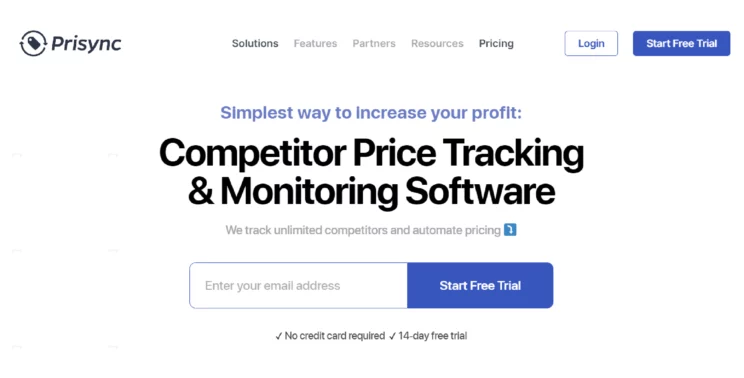
Pros
- The Prisync e-commerce price monitoring tool provides detailed analytics and reporting.
- It lets you optimize product details across different online retailers with their Digital Shelf Management.
Cons
- While the interface of this price monitoring tool is generally user-friendly, some aspects of setup might require some technical understanding, especially for complex integrations.
Pricing
- This e-commerce price monitoring tool is available for a 14-day free trial.
- Their basic plan, which does not provide API access, starts at $99 per month.
10. Dealavo
Dealavo is an online price monitoring tool that offers a set of features for e-commerce analytics and price monitoring. Its dynamic pricing platform can gather data from both online and offline sources.
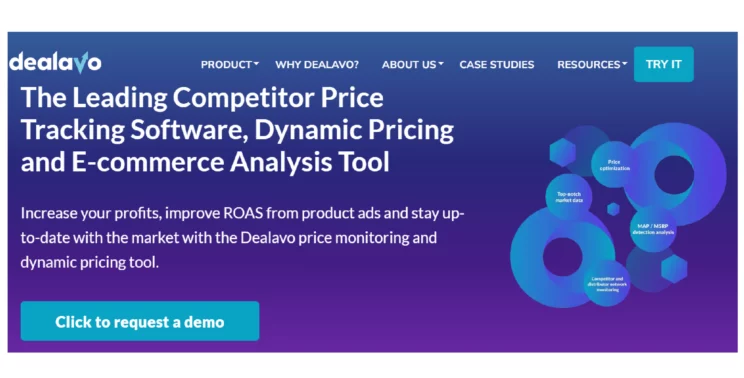
Pros
- This e-commerce price monitoring tool has price tracking software that can compare product prices across different marketplaces, price comparison websites, and specific e-shops.
- It also offers a free Shop Analysis report that helps understand the store’s competitiveness and key competitors.
- It integrates with WooCommerce, IdoSell, and API.
Cons
- Dealavo’s pricing plans can be expensive, especially for smaller businesses.
Pricing
- The Dealavo price monitoring tool offers a 7-day free trial.
- The service prices are discussed per project.
Closing Thoughts on the Best Price Monitoring Tools
It is beyond doubt that price monitoring tools are essential tools for e-commerce businesses. By being able to regularly monitor how competitors price, these tools let business owners improve their pricing strategies, increase their sales and customer satisfaction, and have an improved awareness of the market.
This blog listed the best price monitoring tools available in 2024. You may choose one based on your requirements and capabilities. But if you require a cost-effective and scalable custom price monitoring service, it is best to outsource to a web scraping service like ScrapeHero. Our custom price monitoring solutions can gather and consolidate data from websites like Amazon, eBay, Walmart, Target, and other marketplaces with ease.
Newly emerging price monitoring tools are also worth exploring. While there are options like Camelcamelcamel and Keepa for Amazon, consider MetricsCart for a broader scope. MetricsCart is a digital shelf service provider that helps boost the overall online visibility of the brand across major online retailers. Price monitoring, MAP monitoring, and search ranking are some of the prominent services that MetricsCart offers.
Frequently Asked Questions
There are a few ways to monitor prices in the e-commerce business. One way would be to conduct regular market research by visiting the competitor websites and stores. There are also marketing and research tools that let you observe trends, analyze sentiment, and more. But the better way to go about it is by using price monitoring tools available in the market.
The main reason why e-commerce business owners monitor the prices of their competitors is to stay ahead of them. The idea is to keep track of how their competitors’ prices are changing. By doing so, businesses can ensure that their prices are always placed strategically; not high, not low. By improving their pricing strategy, businesses will be able to increase their sales and make more profit in the long run.

